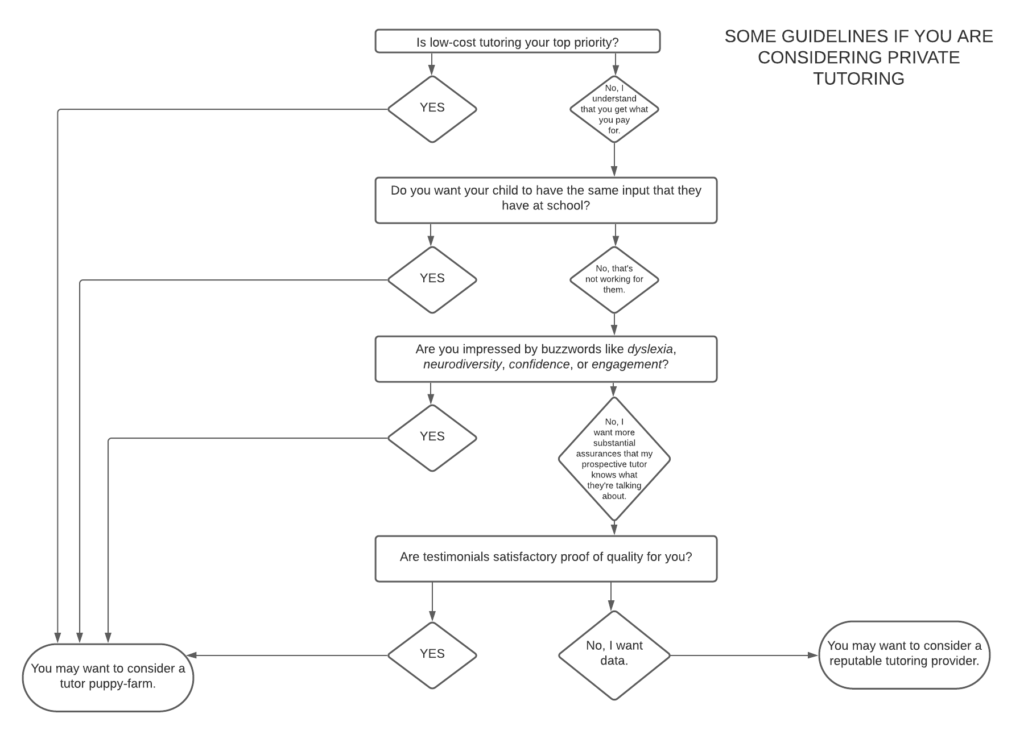Tutor Puppy-Farms: Find the right tree to bark up

It’s true that many children have missed out on vital parts of their education over the last two years. My own dyslexic daughter completed her final education certificate mostly via Zoom and though concessions for the pandemic were on offer, she still missed out on gaining knowledge and on the fun and social benefits that the senior years afford.
Many other children, in need of high quality support, have suffered extended gaps between them and their peers.
Parents have had some insight as to what goes on in elementary classrooms and many have been shocked to discover that instead of teaching children to read in a logical, systematic way, teachers were training kids to guess at words and try to memorise lists of words as if they were shapes.
All of this has increased the demand for tutoring. To meet that demand, governments have put aside millions in funding and sent out calls for tenders from companies who wish to provide tutoring. The consequent pricking-of-ears in the business world and the scramble to corner the tutoring market has been swift.
We can’t keep up here at Lifelong Literacy, so this piece is not to try to drive business through our doors. For most of 2021 we’ve had to turn students away or put them on an extensive waiting list.
‘Why not just employ more staff?’ you may ask. My answer is: because we’re not a tutor puppy-farm.
Our training process takes around two years. You come through my doors as a tutor, I won’t take my eyes off you for two years, and boy, you have to sweat to make it.
One of my tutor mentors called it a ‘baptism of fire’ to begin working here (yeah, Amanda, Patrick dobbed you in :-)*!). You’d better believe it. We don’t have time to make mistakes. Children are not collateral.
Before you even set foot in our training and mentoring program, you have to have a recent qualification in a major systematic synthetic phonics program. If you’re trained in Reading Recovery, LLI, PM Benchmarking, F&P or any balanced literacy offshoots, you are considered tainted and won’t be moved to the next stage of recruitment unless you can mount an incredibly articulate denouncement of your past training. There isn’t time to devote to ‘unlearning’ such deeply awful pedagogy during our training.
We don’t work on a ‘we’ll take you if you’re warm’ basis. We have very specific criteria and we are utterly transparent in announcing those criteria to all. Here’s what a typical response to an inquiry from a prospective tutor looks like:
- Our training and induction process takes a long time. During that time we have a series of online courses that you have to complete and a minimum number of hours you have to spend shadowing our experienced staff.
- Once you are ready to work with clients, there is a minimum number of hours that supervision is required from mentors in our team. We will negotiate that, depending on your qualifications and experience.
- You must be available to build up to a caseload of 15+ clients per week. Anything less will not give you the specialist experience you need in a timeframe that makes you as good as you can be.
- We provide all the materials for your sessions. If you have your own instructional materials, they will be vetted by us. We are a low-variance practice and only use the highest quality resources.
- We have an ongoing program of staff development. We will organise staff training days where we all get together and learn something new. As a staff member, you are also expected to attend Lyn’s live events via Zoom wherever possible. We also study the latest, most relevant books together in an hour-a-week book club type format.
- From time to time, we will recommend a paid professional development workshop that other providers are offering. We will subsidise your attendance to these if we think they’ll be worthwhile.
- If you already run a tutoring practice and plan to continue running that, then I’m afraid this is not the job for you. We are not seeking tutors to funnel business to and train for free, we are seeking committed staff members.
- If you are thinking of this position as a ’stop gap’ towards something ‘better’ coming along, this is not the job for you. The correct candidate will have the capacity to work with Lifelong Literacy long-term. There are several career opportunities within the structure of this business, including training, management and presenting. We employ candidates with a view to career advancement within the organisation.
- High quality written communication with clients and correction of students’ written work features heavily in this job. Strong candidates will demonstrate high levels of proficiency with reading, spelling, punctuation and grammar.
That’s often where the conversation ends.
Those who get past this stage are then vetted further until one or two candidates make it through. That’s where the hard work begins.
Before they go near a student (and under supervision), they have to complete dozens of hours of coursework, they have an extensive booklist that they need to get through and they have seen dozens of lessons. Then two years later, maybe, maybe you’ll be classed as a fully-fledged tutor. Maybe.
But they are paid well and they are looked after. I want my tutors to think of this as their career, so they need to earn a decent living. They need to keep their caseload reasonable. They need to be treated well. That costs money, but it benefits the tutors and students far more than an underpaid, overworked tutor puppy-farm practitioner will.
I am not interested in farming tutors for a machine that spits out marginally competent practitioners. I’m not interested in providing jobs for part-timers with their minds on other things. The stakes are too high. We are talking about life chances. We are talking about fragile self-image, already damaged by incomprehensible (to the child) learning difficulties. We are talking about fundamental education and the damage done to it by systems steeped in outdated practice.
If you are considering engaging the services of a tutoring company, think about what you really want from this. You get what you pay for.
The flowchart below will help you decide.
*On further investigation, it turns out that it was actually me who called it that, Amanda was merely repeating what I said. You’re still a dobber, Patrick! 😉

And once you’ve decided, make sure you ask for the evidence base. Run it by your local dyslexia group. Don’t get sucked into slickness. You may, with a tutor puppy-farm, just by luck, get a tutor who does indeed provide a good and productive learning experience for your child. But is this really something that warrants leaving luck to be the deciding factor?
Code Read Dyslexia Network, a not-for-profit advocacy organisation, are very specific about what kind of tutors will work well for dyslexic students. They have extensive guidelines regarding what to ask, what to look for and who to contact.
The same goes for the Australian Dyslexia Association.
Similarly, the International Dyslexia Association has guidelines to help you avoid tutor puppy-farms.
There are plenty of really high quality tutors out there, but make sure you see their pedigree before committing your child’s precious time.
Best of luck.